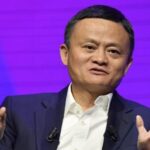- Home
- Billionaires
- Investing Newsletters
- 193CC 1000
- Article Layout 2
- Article Layout 3
- Article Layout 4
- Article Layout 5
- Article Layout 6
- Article Layout 7
- Article Layout 8
- Article Layout 9
- Article Layout 10
- Article Layout 11
- Article Layout 12
- Article Layout 13
- Article Layout 14
- Article Sidebar
- Post Format
- pages
- Archive Layouts
- Post Gallery
- Post Video Background
- Post Review
- Sponsored Post
- Leadership
- Business
- Money
- Small Business
- Innovation
- Shop
Recent Posts
He Xiangjian & Family: The Visionary Behind Midea’s Global Rise

He Xiangjian, one of China’s most iconic entrepreneurs, is a testament to the power of vision, resilience, and adaptability in the rapidly evolving world of business. As the founder of Midea Group, one of the largest home appliance manufacturers globally, He has built not only an empire that spans continents but also a legacy that has influenced China’s economic landscape profoundly. His journey from a modest factory to a multinational conglomerate is a compelling narrative of ambition meeting execution, all while maintaining strong family values and navigating a rapidly changing world.
Born in 1942 in Foshan, Guangdong Province, He grew up in a time when China was undergoing significant transformation. After the founding of the People’s Republic in 1949, the country’s industrial and economic foundation was still in its infancy. In 1968, amid the turmoil of the Cultural Revolution, He Xiangjian, with a small group of fellow villagers, took a leap of faith and invested in a bottle lid production workshop. It was this modest venture that marked the beginnings of what would later become Midea.
Despite the humble start, He was undeterred. His keen sense for business and relentless pursuit of quality enabled him to steer the company through numerous challenges. During the early years, He focused on producing simple household products, but it was in the late 1980s and early 1990s, as China embraced economic reforms and opened up its markets, that Midea began its rapid expansion. Transitioning into home appliances, particularly electric fans and air conditioners, was a strategic move that paid off enormously. He understood that with China’s rising middle class and urbanization, there would be an increasing demand for modern conveniences.
Under He’s leadership, Midea not only expanded its product lines but also invested heavily in technology and innovation. The company built research and development centers and began acquiring advanced technologies to compete globally. This foresight placed Midea at the forefront of the home appliance industry. In 2016, Midea made international headlines by acquiring Germany’s KUKA, a leading robotics company, signaling the company’s commitment to intelligent manufacturing and automation. This bold move showcased He’s belief that innovation was the key to sustainability and growth in the modern age.
Although He officially stepped down from the day-to-day management of Midea in 2012, handing over leadership to professional managers, his influence still looms large. His decision to transition control reflected a forward-thinking governance philosophy uncommon in many founder-led businesses. By entrusting seasoned executives, He ensured that Midea remained agile and professionally run while he retained a significant shareholding, reflecting his continued commitment and belief in the company’s mission.
Family has played an important role in He’s journey. Unlike many other tycoons, He has chosen to separate ownership from operations, ensuring that personal ties do not compromise professional performance. However, his son, He Jianfeng, plays a significant role in the business as a key shareholder and board member. This blend of family legacy and corporate professionalism is one of the unique strengths of Midea’s structure. It allows for continuity and stability while fostering a performance-driven culture.
The He family has also become known for its substantial wealth, consistently ranking among the richest families in China. With a net worth often exceeding tens of billions of dollars, their fortune is closely tied to Midea’s market performance. Yet, despite their immense wealth, the He family has largely maintained a low profile. He Xiangjian himself is known for being media-shy and reserved, preferring to let the company’s achievements speak for themselves.
In 2020, He Xiangjian faced a shocking incident when he became the target of a kidnapping attempt at his Foshan villa. The case made national headlines, not only because of He’s status but also due to the rarity of such crimes targeting high-profile billionaires in China. Fortunately, the attempt was thwarted by police, and He was rescued without injury. The incident sparked discussions on the security challenges that come with immense wealth in an increasingly unequal society.
Despite the risks and challenges, He has remained a pillar of inspiration in the business world. He is often seen as a symbol of China’s entrepreneurial rise and its transition from a manufacturing-based economy to one that is increasingly driven by technology and innovation. His business philosophy, emphasizing quality, integrity, and forward-thinking, has helped shape modern Chinese industry. He’s life work stands as an example to countless other entrepreneurs across China and beyond who dream of building something from the ground up.
Even in his advanced age, He Xiangjian continues to wield influence in business and philanthropic circles. While not known for flamboyant charity efforts, he has quietly contributed to education and local community initiatives, aligning with the traditional values of humility and social responsibility that many Chinese entrepreneurs uphold.
The story of He Xiangjian and his family is more than just a tale of financial success; it is about vision, discipline, and unwavering determination. From assembling bottle caps in a workshop to leading a global home appliance powerhouse, He has defied the odds and redefined what is possible through strategic planning and hard work. The Midea Group stands today as not only a business empire but a reflection of one man’s lifetime of dedication and the collective spirit of a family committed to enduring excellence. As the world watches China’s economy continue to evolve, the legacy of He Xiangjian and his family will undoubtedly remain a touchstone for generations of entrepreneurs to come.
- air conditioning industry
- appliance industry
- Automation in Manufacturing
- billionaire kidnapping China
- business governance
- business in China
- Business Legacy
- Business Resilience
- business risk management
- CEO succession
- China economic reform
- China's richest families
- Chinese billionaires
- Chinese business legends
- Chinese companies abroad
- Chinese Economy
- Chinese entrepreneurs
- Chinese innovation
- Chinese tycoons
- Chinese wealth
- cultural revolution survivors
- Entrepreneurship
- family business structure
- family businesses
- Foshan industry
- Global Manufacturing
- Guangdong entrepreneurs
- He Jianfeng
- He Xiangjian
- home appliance market
- industrial visionaries
- industrialization in China
- Innovation in Appliances
- international mergers
- KUKA acquisition
- leadership transitions
- Legacy Building
- low profile billionaires
- manufacturing tycoons
- Midea founder
- Midea Group
- philanthropy in China
- private enterprise China
- Research and Development
- robotics in China
- smart appliances
- strategic business growth
- tech-savvy companies
- wealth and security
Recent Posts
Categories
- 193 Countries Consortium Partner1
- 193cc Digital Assets2
- 5G1
- Aerospace & Defense48
- AI37
- Arts3
- Banking & Insurance11
- Big Data3
- Billionaires1,506
- Boats & Planes1
- Business332
- Careers13
- Cars & Bikes79
- CEO Network1
- CFO Network17
- CHRO Network1
- CIO Network1
- Cloud10
- CMO Network18
- Commercial Real Estate7
- Consultant1
- Consumer Tech194
- CxO1
- Cybersecurity73
- Dining1
- Diversity, Equity & Inclusion4
- Education7
- Energy8
- Enterprise Tech29
- Events11
- Fintech1
- Food & Drink2
- Franchises1
- Freelance1
- Future Of Work2
- Games149
- GIG1
- Healthcare79
- Hollywood & Entertainment203
- Houses1
- India’s 1000 Richest1
- Innovation46
- Investing2
- Investing Newsletters4
- Leadership65
- Lifestyle11
- Manufacturing1
- Markets20
- Media327
- Mobile phone1
- Money13
- Personal Finance2
- Policy569
- Real Estate1
- Research6
- Retail1
- Retirement1
- Small Business1
- SportsMoney42
- Style & Beauty1
- Success Income1
- Taxes2
- Travel10
- Uncategorized15
- Vices1
- Watches & Jewelry2
- world's billionaires1,475
- Worlds Richest Self-Made Women2
Related Articles
Francis Choi: The Toy Tycoon Behind a Billion-Dollar Empire
Francis Choi Chee-ming, often referred to as Hong Kong’s “King of Toys,”...
By 193cc World's BillionairesJune 6, 2025Francine von Finck and the Legacy of a Discreet Fortune
Francine von Finck, a name that commands respect in elite business circles,...
By 193cc World's BillionairesJune 6, 2025The Life and Legacy of Stefano Pessina
Stefano Pessina, one of the most influential figures in the global pharmaceutical...
By 193cc World's BillionairesJune 6, 2025John Morris: A Life of Vision, Growth, and Legacy
John Morris, the founder of Bass Pro Shops, is an iconic figure...
By 193cc World's BillionairesJune 6, 2025















Leave a comment